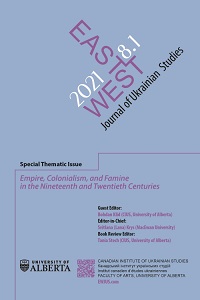Stalin’s Faminogenic Policies in Ukraine: The Imperial Discourse
Stalin’s Faminogenic Policies in Ukraine: The Imperial Discourse
Author(s): Lyudmyla HrynevychSubject(s): Political history, Interwar Period (1920 - 1939), History of Communism
Published by: Canadian Institute of Ukrainian Studies at The University of Alberta
Keywords: faminogenic policy; Holodomor; genocide; Ukraine; famine; imperialism, colonialism;
Summary/Abstract: Because Stalin’s policy of famine creation in the early 1930s has been viewed through the prism of communist theory and practices, scholars have paid less attention to the imperial/colonial discourse of the period. This essay attempts to show the suitability of applying theoretical models of dependence and imperialism to analyze the dynamics and consequences of the collectivization of agriculture and the Holodomor (the mass deaths through starvation in Ukraine). The pressure applied to all regions of the USSR, resulting from the “communist experiment,” was in Soviet Ukraine supplemented and intensified, and, at some points, determined by a system of centre-periphery relations, characterized by political domination, control, the subordination of regional political elites to the centre, and the exploitation of economic resources. The appropriation of sovereignty over the Ukrainian republic by the central government in Moscow included establishing full control over Ukraine’s food resources, such as determining grain harvesting and distribution. The ongoing exploitation of Ukrainian economic resources and the anti-Ukrainian terror caused the Ukrainian famine of 1928-29. These also became significant factors in the onset of the 1932-33 Holodomor.
Journal: East/West: Journal of Ukrainian Studies (EWJUS)
- Issue Year: 8/2021
- Issue No: 1
- Page Range: 99-143
- Page Count: 45
- Language: English

